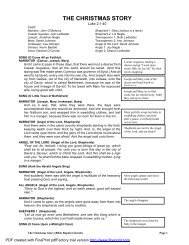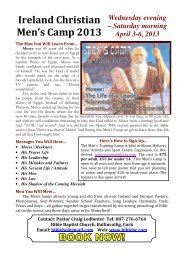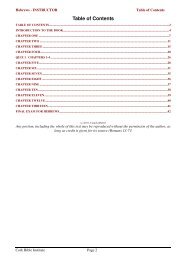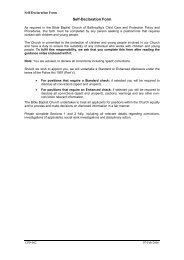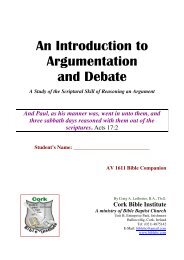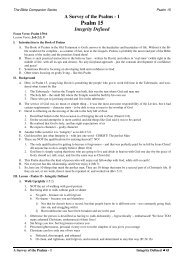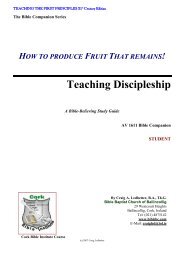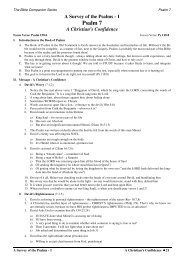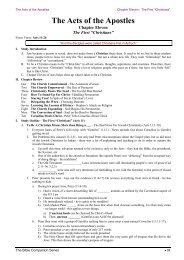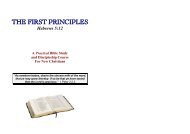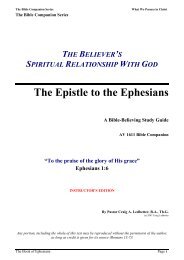THE DOCTRINE OF SALVATION - Student.pdf - Bible Baptist ...
THE DOCTRINE OF SALVATION - Student.pdf - Bible Baptist ...
THE DOCTRINE OF SALVATION - Student.pdf - Bible Baptist ...
You also want an ePaper? Increase the reach of your titles
YUMPU automatically turns print PDFs into web optimized ePapers that Google loves.
Soteriology<br />
The Vocabulary Of Salvation.<br />
O. Imputation<br />
“Blessed is the man to whom the Lord will not impute sin” (Rom. 4:8).<br />
1. Definition of imputation:<br />
a. To impute is the act of one person something good or bad to the account of another person.<br />
In the <strong>Bible</strong>, it is a little more strict, meaning that a swap out is made: one person’s sins swapped<br />
out for righteousness, or vice-a-versa.<br />
2. Kinds of imputation:<br />
a. In the <strong>Bible</strong> there are three main theological imputations:<br />
1) The imputation of sin upon the human race.<br />
a) “Wherefore, as by one man sin entered into the world, and death by sin; and so death<br />
passed upon all men, for that all have sinned” (Rom. 5:12).<br />
b) “For as in Adam all die” (1 Cor. 15:22; see also Rom. 3:23).<br />
c) This first imputation seems at first to be totally unjust. Why should Adam’s sin be<br />
imputed to me when it happened in a remote part of this world thousands of years before<br />
I was even born? If the story ended here it might be unjust, but it doesn’t. Read on.<br />
2) The imputation of the race’s sin upon . “But he was wounded for our transgressions, he<br />
was bruised for our iniquities; the chastisement of our peace was upon him, and with his<br />
stripes we are healed” (Isa. 53:5).<br />
a) “My righteous servant (shall) justify many; for he shall bear their iniquities” (Isa. 53:11).<br />
b) “That he, by the grace of God, should taste death for every man” (Heb. 2:9). “Who his<br />
own self bore our sins his own body on the tree, that being dead to sins, should live unto<br />
righteousness; by whose stripes ye were healed” (1 Pet. 2:24; see also 2 Cor. 5:14-21).<br />
The first imputation was an unwilling one (for no human would voluntarily accept<br />
Adam’s guilt), but the second imputation was effected upon a totally willing volunteer.<br />
“I am the good shepherd; the good shepherd giveth his life for the sheep” (Jn. 10:11).<br />
c) “No man taketh it from me, but I lay it down of myself . . .” (Jn. 10:18).<br />
3) The imputation of righteousness upon the believing sinner.<br />
a) “But what things were gain to me, those I counted loss for Christ. Yea doubtless, and I<br />
count all things but loss for the excellency of the knowledge of Christ Jesus my Lord; for<br />
whom I have suffered the loss of all things and do count them but dung, that I may win<br />
Christ, and be found in him, not having mine own righteousness which is of the law, but<br />
that which is through the faith of Christ, the righteousness which is of God by faith”<br />
(Phil. 3:7-9).<br />
b) This imputation, like the second, must be voluntary. God forces the righteousness of<br />
Christ upon no one.<br />
3. Biblical examples of imputation.<br />
a. Abraham.<br />
1) “And the scripture was fulfilled which saith, Abraham believed God, and it was imputed unto<br />
him for righteousness: and he was called the friend of God” (Jas. 2:23; see also Gen. 15:6;<br />
Rom. 4:3).<br />
b. David<br />
1) “Even as David also describeth the blessedness of the man unto whom God imputeth<br />
righteousness without works, saying, Blessed are they whose iniquities are forgiven, and<br />
whose sins are covered. Blessed is the man to whom the Lord will not impute sin” (Rom.<br />
4:6-8; see also Ps. 32:1, 2).<br />
Cork <strong>Bible</strong> Institute Page 19




